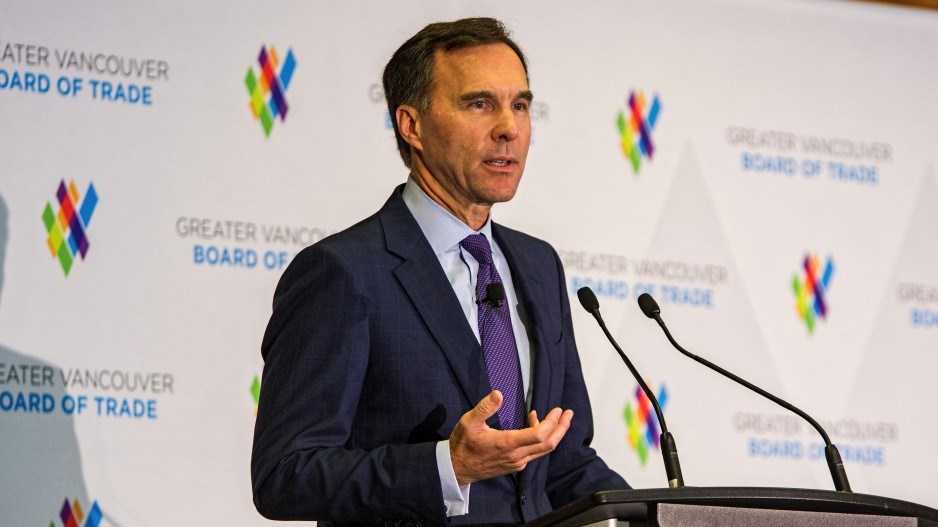Even before the Trudeau government managed to score the economic equivalent of two home runs in one game, Canada was already performing well economically, federal finance Minister Bill Morneau told a group of Vancouver business people Tuesday October 2.
Canada’s growth rate in 2017 was the fastest of the G7 countries, unemployment was at a 40-year low, and the country was seeing “real wage growth across the country,” Morneau told the Greater Vancouver Board of Trade (GVBOT), fresh from this morning’s signing agreement on the $40 billion LNG Canada project.
Despite that performance, a cloud of uncertainty has loomed over the Canadian economic horizon.
The very real threat of Canada’s biggest trade partner scrapping the North American Free Trade Agreement (NAFTA), and a cascade of cancellations or delays on major energy projects, including the Trans Mountain pipeline expansion, have contributed to the erosion of business confidence in Canada.
But on Monday, October 1, two major agreements were announced back-to-back that appears to have created a break in the clouds.
Yesterday, the Canadian government signed a renewed free trade agreement with the U.S. and Mexico – the rebranded United States-Mexico-Canada Agreement (USMCA).
Later that evening, LNG Canada announced that all five partners in the $40 billion project had taken a final investment decision. The agreement was officially signed this morning.
“I don’t think there could be a better demonstration of confidence in Canada than when five international organizations commit to $40 billion in expenditure over the long-term,” Morneau told a group of GVBOT members at a noon-hour talk. “It doesn’t get any better than that.”
Pundits are still poring over the new USMCA agreement, which appears to be not as dramatic a revision of NAFTA as it might have been.
One of the biggest concessions coming from Canada is opening the Canadian market to more American dairy products, and some new provisions for the automobile sector. The concessions on supply management have angered dairy farmers.
“Canada already imports five times more dairy products from the U.S. than it exports,” said Trevor Hargreaves, a spokesman for the BC Dairy Association. “There is no justification for additional access under this deal.”
Morneau defended the concession, saying it only opens Canada’s market to American dairy products by 3.9%, and said Canadian dairy farmers will be eligible for compensation. No details on the compensation program have been revealed yet.
The agreement does not address American steel and aluminum tariffs. Nor does the agreement address the single most important trade issue for B.C. – softwood lumber.
“We’re just not able to solve every single thing before the deadline,” Morneau said.
But the new agreement at least retains the dispute mechanism – Chapter 19 – that Canada has used successfully in the past to recover softwood lumber duties from the U.S. when it, invariably, wins at international trade tribunals.
Morneau said his government will continue to work on resolutions to softwood lumber and steel tariffs, but suggested the issue may not be uppermost in mind in the U.S. right now, since it is in a mid-term election cycle.
One new provision in the USMCA appears to challenge Canada’s sovereignty when it comes to negotiating trade agreements with other countries. The agreement has a provision that requires any of the partners to see the text of any proposed trade agreements with “non-market” countries.
That is well understood to mean China. And if the U.S. doesn’t like the trade agreements Canada is trying to negotiate, the U.S. reserves the right to withdraw from the USMCA.
Morneau said the reason for that provision is that the U.S. is trying to overhaul its trade relationship with China, and doesn’t want any trade agreements signed with its other trade partners that would give China “a back door” to the American market.
That doesn’t mean Canada won’t continue to talk with China on improving trade in specific markets.
While maintaining good trade relations with the U.S. is important, Morneau added that there are some sectors of the Canadian economy that need to diversify – oil and gas being two examples.
“We need to be thinking about the world and where we can have the most receptive markets for what we can produce,” Morneau said.
While the LNG Canada project is a positive move in that regard, one of the Trudeau government’s biggest challenges – now that NAFTA talks are behind them – is salvaging the Trans Mountain pipeline expansion.
Not long after the Trudeau government agreed to pay Kinder Morgan Canada (TSX:KML) $4.5 billion for the existing Trans Mountain pipeline and its expansion project, the Appeal Court of Canada threw a spanner into the works by quashing the expansion’s approval.
The government now has to go back to the drawing board on two key issues, if it wants the project to proceed – First Nations consultations and addressing marine impacts from increased tanker traffic.
Asked if, in light of the recent signals of renewed confidence in Canada, now might be the time to seek a buyer for the Trans Mountain pipeline, Morneau said it wasn’t.
He said the government needs to address the two items identified by the court first.
“As we get farther down the road, as we get the project done in the right way, then I think the overall sense of business confidence that we are able to generate it will be possible.”




